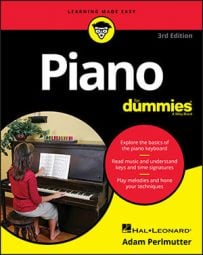After you decide to hire a private piano teacher, your next step is to find one, a good one. Oh, sure, you think it’s easy, but finding a good teacher takes time, commitment, and patience. Many pianists change teachers three or four times in the span of a career.
Whom else have you taught?
Possible answers:
“I’ve had several students over the years and would be happy to give you some of their names and numbers so that you can contact them.”
“Just a few: Leonard Bernstein, Rudolf Serkin, and André Watts.”
“No one. You’ll be my first.”
Get a list of references from the teacher candidate and contact each person on the list, if possible. Assess your teacher’s overall abilities by asking current and former students what they like and don’t like about the teacher and how long they’ve taken lessons with the teacher.
How long have you been teaching and playing?
Possible answers:
“Over 25 years, and I love it.”
“I retired from public performance three years ago and decided to start teaching.”
“Since lunch.”
Whether it’s years of playing, years of studying, or years of teaching, experience is a must for any good teacher. Without it, you’ll both be learning as you go, but you won’t be the one getting paid by the hour.
How much do you expect me to practice?
Possible answers:
“An hour a day.”
“Fifteen minutes a day.”
“Until you can play ‘Rhapsody In Blue’ blindfolded.”
Be honest about the time you have available for practicing. If you’re comfortable with the response to your question, that’s a good sign.
Let the teacher know your goals. How much you need to practice really depends on what you want to get out of piano lessons and how much time you’re willing and able to dedicate to playing piano.
Would you mind playing something for me?
Possible answers:
“Sure, what key would you like it in?”
“Well, I’d be happy to play for you. How about a bit of Fats Waller?”
“I don’t really play. I’m just a good teacher.”
How well does your candidate play? Ask her to play something for you. Your ears will tell you the answer.
Don’t head for the door if you get the third answer. A good teacher may be very skilled in listening and correcting your technique without being able to make her own fingers play the music.
What repertoire do you teach?
Possible answers to the question of what repertoire an instructor teaches include the following:
“I like all music. We’ll start with the classics and work our way up to today’s Top Ten.”
“The three B’s: Bach, Beethoven, and Brahms.”
“Come again?”
If you want to play rockabilly or jazz or R&B, find out whether your teacher is willing to teach you those styles. Granted, you have to work your way up to playing these other styles by starting with the basics. But as you improve, you want a teacher who lets you pick your own repertoire to some extent.
How do you feel about wrong notes, mistakes, and slow learners?
Possible answers:
“To err is human.”
“Mistakes are the path toward learning.”
[Fist pounds the table] “I abhor imperfection.”
You want your teacher to teach you at your pace and be willing to adjust to your learning curve, as long as you put in the effort.
What methods do you use to teach piano?
Possible answers:
“I use the internationally respected blankety-blank method.”
“My method varies depending on the needs of each student. we can begin with… .”
“Let’s just see what happens.”
Each teacher has his own method of teaching. Whatever the method, your teacher should teach piano in a way you’re comfortable with.
Where will the lessons take place?
Possible answers:
“Right here in my living room at my Steinway.”
“I am happy to teach at your home if you have a keyboard and feel more relaxed in a familiar environment.”
“In the alley behind the stadium after midnight.”
As with real estate, location is everything. You don’t want any excuses to skip piano lessons.
Though having your lessons at your home may sound convenient, consider a few disadvantages. When your lesson time comes, you’re responsible for minimizing interruptions and providing a reasonably clean area for the lesson.
A teacher’s home or studio is often ideal because you can count on a comfortable, professional work environment and a good piano. When you go to your teacher’s place, you’re relieved of the responsibilities and distractions of home.
How much do you charge?
Possible answers to the question of how much a teacher charges include:
“I require $45 per hour-long lesson. We’ll meet once a week, and I ask that you give me plenty of notice if you must cancel.”
“We’ll schedule four lessons per month, and you’ll pay me $300 each month.”
“How can you put a price on art?”
On average, most teachers charge between $40 and $70 per hour. However, depending on a number of economic factors, including notoriety and demand, your teacher may command more than $100 per hour. Lower rates may also be available depending on where you live and the circumstances of the teacher.
Do you have student recitals?
Possible answers:
“Yes. I rent the college concert hall and have a recital for all my students. You can invite as many guests as you like, and I serve soft drinks and cookies at intermission.”
“No, but that’s an excellent idea for this year.”
“Sure, if Dad will let me use the barn.”
Playing for an audience is fun, and for many, it’s the main reason to play the piano. Your teacher should plan the recital, find the venue, advertise the show, and prepare you for the spotlight.

